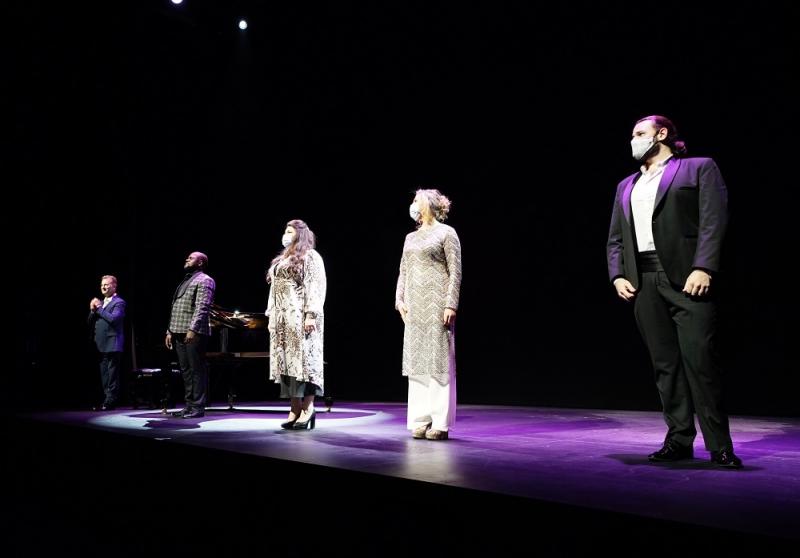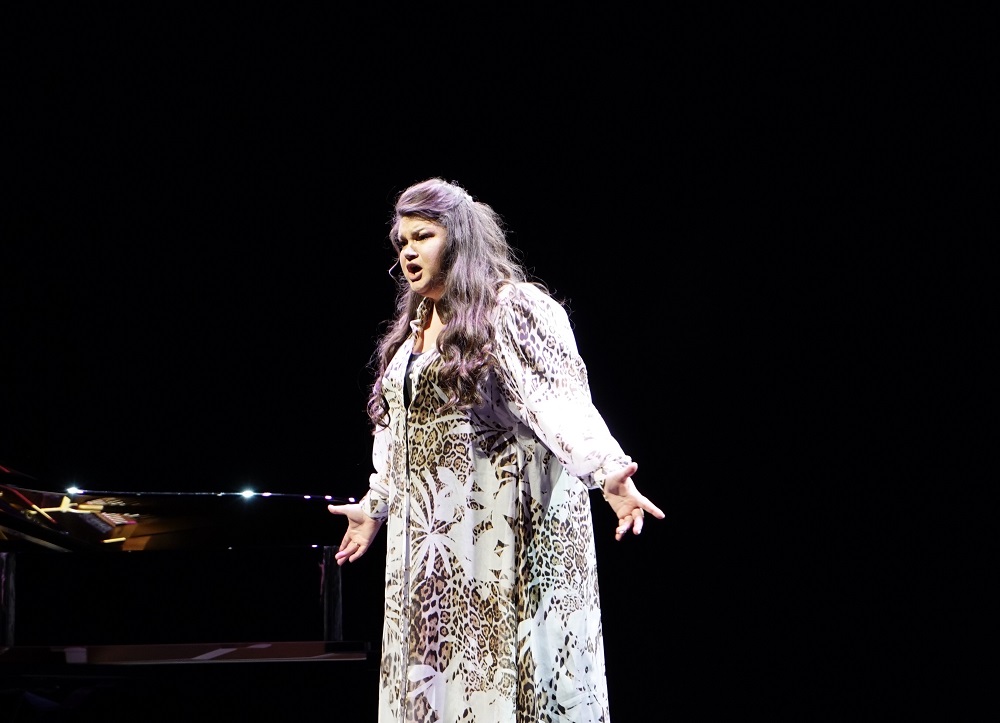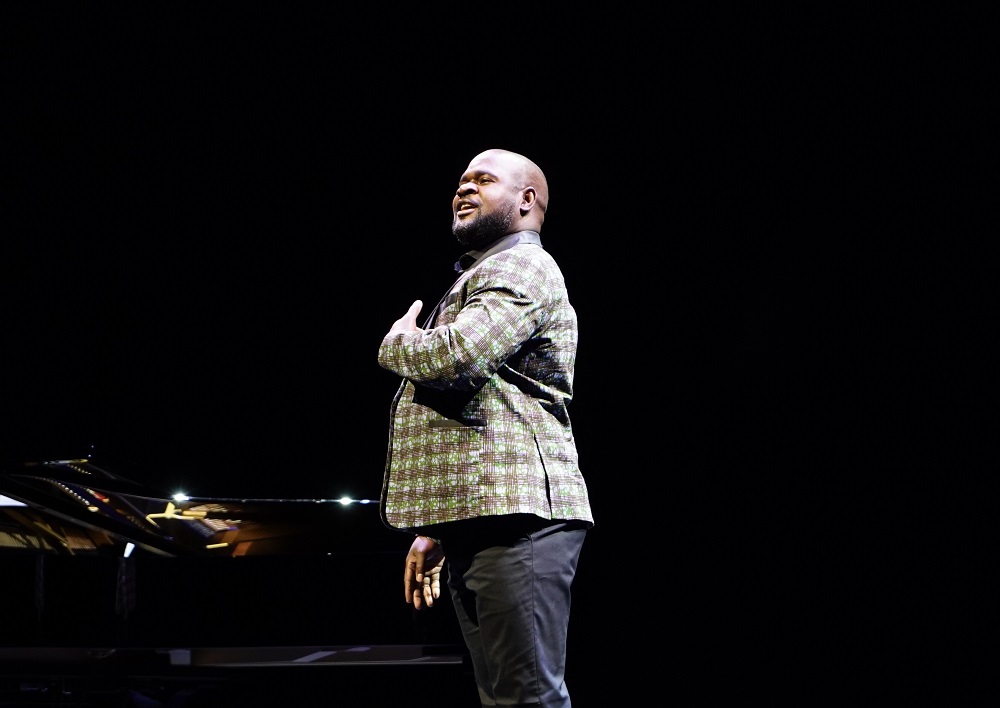Meet the Young Artists Week recital, Linbury Theatre – four big personalities | reviews, news & interviews
Meet the Young Artists Week recital, Linbury Theatre – four big personalities
Meet the Young Artists Week recital, Linbury Theatre – four big personalities
Frissons and high drama from Royal Opera acolytes in song

Throughout this most difficult of years, the Royal Opera has done the right thing for the singers on its Jette Parker Young Artists Programme. They were fortunate to finish the run of Handel’s Susanna before the Linbury Theatre closed down for over seven months (yesterday saw its reopening to a necessarily small audience).
The event was not a competition or a pageant of promise, but a vital opportunity for the singers to project the inherent drama of songs in different languages (French, Italian, Spanish, Russian). They had a sympathetic audience willing them on, and our reward was frissons when each performer released the full pelt of his or her glorious voices at climaxes. This is work in progress, of course, and the mix of first and second year JPYAPers meant varying levels of polish, but the promise seemed unlimited, the possibilities thrilling.  None more so than from the singer new to most of us, Ukrainian mezzo/contralto Kseniia Nikolaieva. Hers is a big voice unleashed with enough power to tell us that with careful handling she will undoubtedly go where her compatriots Olga Borodina and Ekaterina Semenchuk have already trod, in roles with very specific voice-type requirements like Verdi’s Azucena in Il trovatore. She got to launch in her native language, feeling the pain of Rachmaninov and Tchaikovsky; you won’t have heard “None but the lonely heart” ever delivered more operatically, but at that pitch the cut of the chest voice on the second note was thrilling. She’ll need to find a way of sustaining pianissimos with proper support, but that will surely come.
None more so than from the singer new to most of us, Ukrainian mezzo/contralto Kseniia Nikolaieva. Hers is a big voice unleashed with enough power to tell us that with careful handling she will undoubtedly go where her compatriots Olga Borodina and Ekaterina Semenchuk have already trod, in roles with very specific voice-type requirements like Verdi’s Azucena in Il trovatore. She got to launch in her native language, feeling the pain of Rachmaninov and Tchaikovsky; you won’t have heard “None but the lonely heart” ever delivered more operatically, but at that pitch the cut of the chest voice on the second note was thrilling. She’ll need to find a way of sustaining pianissimos with proper support, but that will surely come.
Malaba, the other relative newcomer (pictured below), born in the Democratic Republic of Congo before training in Ukraine, where he was studying for an economics degree, has the true bass voice and the undoubted gift of the born communicator – he knew how to fix individual members of the audience with intense glances. Again, the Jette Parker programme is there to help with finessing over time, but Poulenc’s "La belle jeunesse" from Chansons Gaillardes was a spirited and meaningful delight, and the voice-type is perfect for Russian/Caucasian melancholy in Rachmaninov’s early Pushkin setting “Do not sing for me, o fair one, the sad songs of Georgia”.  Lowe proved that there are darker colours in the soprano voice than would have been appropriate to hear in her Handel with “C'est l'extase langoureuse“ from Debussy's Ariettes oubliées, gave due notice of her Straussian lyric credentials in "Epheu" (the clinging ivy) his from Mädchenblumen and went the whole dramatic hog with focused panache in the “ay, ay, ay ay”s of Nin’s."Canto Andaluz".
Lowe proved that there are darker colours in the soprano voice than would have been appropriate to hear in her Handel with “C'est l'extase langoureuse“ from Debussy's Ariettes oubliées, gave due notice of her Straussian lyric credentials in "Epheu" (the clinging ivy) his from Mädchenblumen and went the whole dramatic hog with focused panache in the “ay, ay, ay ay”s of Nin’s."Canto Andaluz".
The biggest numbers went to Uruguayan tenor Presno, who rose to the big ask of starting the concert with Duparc’s "L’Invitation au voyage," rising to epic status in the second verse. That was true, too, of his Liszt Petrarch Sonnet setting “Pace non trovo,” where the endless top notes rang out with clarion brilliance and he managed to stop just short of the tenorial instinct to over-emote: thrilling without vulgarity (and a reminder that Liszt’s real talent, once you strip away all the piano notes, tends more to the heightened realms of Italian opera than to any Germanic profundity).
Artistic Director of the JPYAP David Gowland provided perfect, calm support for all four of his protégés, and introduced the songs, though it would have been good practice for the artists if they’d done that themselves, Remembering Katie Derham’s chat with the utterly engaging Malaba in the second of the livestreamed events from the main house, I even wished for once that there had been a compère present. But be careful what you ask for…
rating
Explore topics
Share this article
The future of Arts Journalism
You can stop theartsdesk.com closing!
We urgently need financing to survive. Our fundraising drive has thus far raised £49,000 but we need to reach £100,000 or we will be forced to close. Please contribute here: https://gofund.me/c3f6033d
And if you can forward this information to anyone who might assist, we’d be grateful.

Subscribe to theartsdesk.com
Thank you for continuing to read our work on theartsdesk.com. For unlimited access to every article in its entirety, including our archive of more than 15,000 pieces, we're asking for £5 per month or £40 per year. We feel it's a very good deal, and hope you do too.
To take a subscription now simply click here.
And if you're looking for that extra gift for a friend or family member, why not treat them to a theartsdesk.com gift subscription?
more Opera
 Tosca, Welsh National Opera review - a great company reduced to brilliance
The old warhorse made special by the basics
Tosca, Welsh National Opera review - a great company reduced to brilliance
The old warhorse made special by the basics
 BBC Proms: The Marriage of Figaro, Glyndebourne Festival review - merriment and menace
Strong Proms transfer for a robust and affecting show
BBC Proms: The Marriage of Figaro, Glyndebourne Festival review - merriment and menace
Strong Proms transfer for a robust and affecting show
 BBC Proms: Suor Angelica, LSO, Pappano review - earthly passion, heavenly grief
A Sister to remember blesses Puccini's convent tragedy
BBC Proms: Suor Angelica, LSO, Pappano review - earthly passion, heavenly grief
A Sister to remember blesses Puccini's convent tragedy
 Orpheus and Eurydice, Opera Queensland/SCO, Edinburgh International Festival 2025 review - dazzling, but distracting
Eye-popping acrobatics don’t always assist in Gluck’s quest for operatic truth
Orpheus and Eurydice, Opera Queensland/SCO, Edinburgh International Festival 2025 review - dazzling, but distracting
Eye-popping acrobatics don’t always assist in Gluck’s quest for operatic truth
 MARS, Irish National Opera review - silly space oddity with fun stretches
Cast, orchestra and production give Jennifer Walshe’s bold collage their all
MARS, Irish National Opera review - silly space oddity with fun stretches
Cast, orchestra and production give Jennifer Walshe’s bold collage their all
 Káťa Kabanová, Glyndebourne review - emotional concentration in a salle modulable
Janáček superbly done through or in spite of the symbolism
Káťa Kabanová, Glyndebourne review - emotional concentration in a salle modulable
Janáček superbly done through or in spite of the symbolism
 Buxton International Festival 2025 review - a lavish offering of smaller-scale work
Allison Cook stands out in a fascinating integrated double bill of Bernstein and Poulenc
Buxton International Festival 2025 review - a lavish offering of smaller-scale work
Allison Cook stands out in a fascinating integrated double bill of Bernstein and Poulenc
 Tosca, Clonter Opera review - beauty and integrity in miniature
Happy surprises and a convincing interpretation of Puccini for today
Tosca, Clonter Opera review - beauty and integrity in miniature
Happy surprises and a convincing interpretation of Puccini for today
 Hamlet, Buxton International Festival review - how to re-imagine re-imagined Shakespeare
Music comes first in very 19th century, very Romantic, very French operatic creation
Hamlet, Buxton International Festival review - how to re-imagine re-imagined Shakespeare
Music comes first in very 19th century, very Romantic, very French operatic creation
 Falstaff, Glyndebourne review - knockabout and nostalgia in postwar Windsor
A fat knight to remember, and snappy stagecraft, overcome some tedious waits
Falstaff, Glyndebourne review - knockabout and nostalgia in postwar Windsor
A fat knight to remember, and snappy stagecraft, overcome some tedious waits
 Salome, LSO, Pappano, Barbican review - a partnership in a million
Asmik Grigorian is vocal perfection in league with a great conductor and orchestra
Salome, LSO, Pappano, Barbican review - a partnership in a million
Asmik Grigorian is vocal perfection in league with a great conductor and orchestra
 Semele, Royal Opera review - unholy smoke
Style comes and goes in a justifiably dark treatment of Handelian myth
Semele, Royal Opera review - unholy smoke
Style comes and goes in a justifiably dark treatment of Handelian myth

Add comment